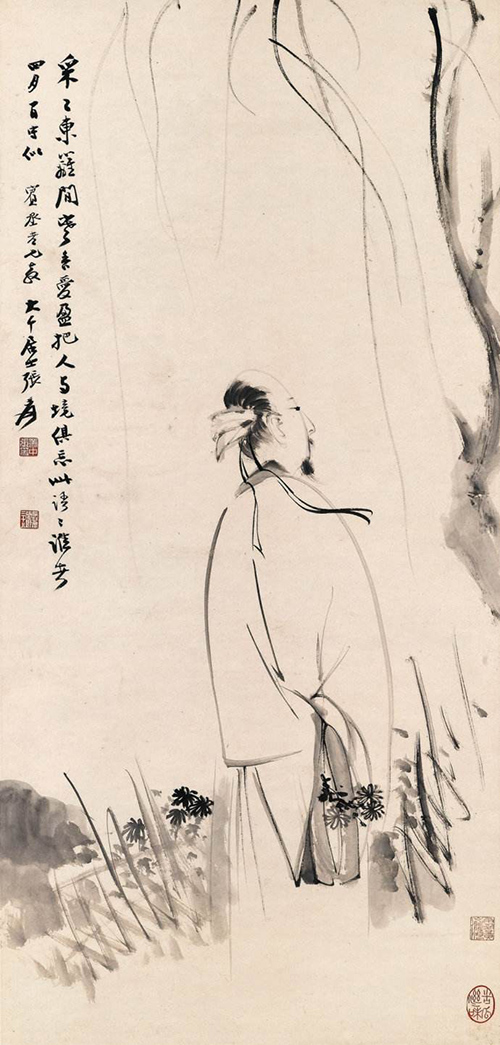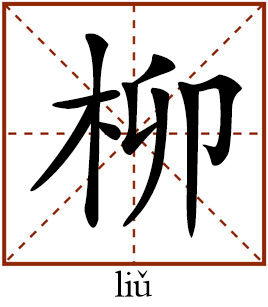Five-Willow Gentleman Tao Yuanming preferred principles over wealth, distinction

The biography of Five-Willow Gentleman is a life manifestation of Tao Yuanming.

The character for the willow tree is a homophone of the character liu, which means asking a person to stay when bidding farewell. Thus it symbolizes the sorrow of separation.
Chinese philosopher Zong Baihua (1897-1986) once said that the period that extended from the late Han Dynasty to the Wei-Jin and Six Dynasties (c. 220-589) was the most chaotic age in terms of its political situation and the period in which the people suffered the most. “However, it was also an extremely free and liberated period as well as the most insightful and passionate age in Chinese spiritual history,” he said.
It is true that it was a divided and confronting age. The gentry class had a monopoly over the power to select officials. Scholars from families of lower classes rarely had the chance to be selected to serve the nation. However, this period also gave rise to a distinguished and admirable figure—Tao Yuanming.
Writer Qian Zhongshu argued that the word “bu” which means “no” or “not” represented Tao’s semi-autobiographical story A Biography of the Five-Willow Gentleman. The word “no” was used nine times to skillfully structure the article, portraying the graceful personality of Tao Yuanming himself.
In the story, Tao wrote “Nobody knows his native place, his surname or his courtesy name.” Tao did not use “I” in the article when describing the places he was from nor the achievements he made in his life. Instead, he named the protagonist after the five willows planted by the side of “his” house. This demonstrates his move to free himself from the prevailing convention of valuing one’s family background at the time.
“He is reticent and keeps himself away from wealth and distinction.” Because the author was detached and without desire, he did not have any urge to accumulate wealth or distinction. He loved reading books as a matter of habit. As the article goes “He is fond of reading but reads without seeking a thorough understanding.” He “is addicted to drinking,” but “lacks rice wine because he is poor.” Once he had the opportunity to drink his fill, he would forthrightly and sincerely “withdraw when he got drunk, never to regret having to take his leave.”
He never compromised on his beliefs, even though doing so could have changed his impoverished situation. Therefore, although his “unfurnished house even cannot shelter him from the wind and the sun,” he “often amuses himself by writing something to express his aspirations.” Eventually, he developed a distinguished personality in which “Neither [did he have] a grudge about his poverty nor seek after wealth and distinction.”
Influenced by his family, Tao developed an aspiration to benefit humankind, but he was not from a influential family and the aristocratic class had cut off access to officialdom for the people like him. His father and grandfather only served as petty officials. When Tao was selected as an official at the age of 29, he “loathed the madding crowd since I was a boy, while hills and mountains filled me with joy.” He despised the hustle and bustle of officialdom and those who pursued personal gains by all means necessary.
Although “With aims to ride the seas and seize the star, I wished to take on wings and fly afar,” he was born in a time when “So dim and somber is the day, That the floods are running on the way.” There was nothing that he could do but sigh “By mistake I sought mundane careers; And got entrapped in them for thirty years.”
Filled with so much righteous indignation, he “will drink to the last drop in their homes and get drunk at last.” It was his silent protest against the reality. “He often amuses himself by writing something to express his aspirations.” It was clear: he described and expressed himself by describing the “Five-Willow Gentleman.”
(edited by CHEN ALONG)
